

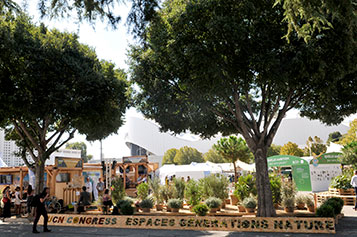 Much has been said about the World Congress of the International Union for the Conservation of Nature (IUCN) which brought together experts from all over the World in Marseille from 3rd to 11th September 2021 and which was inaugurated by the President of the French Republic. The subject of this session was biodiversity and its conservation. An idea the French allotment gardeners know well.
Much has been said about the World Congress of the International Union for the Conservation of Nature (IUCN) which brought together experts from all over the World in Marseille from 3rd to 11th September 2021 and which was inaugurated by the President of the French Republic. The subject of this session was biodiversity and its conservation. An idea the French allotment gardeners know well.
Many thanks are addressed to the presidents of the allotment garden sites and the allotment gardeners who answered the questionnaire of our biodiversity study! They gave us the opportunity to speak twice during the « Espaces Génération Nature » which were opened to the public. The three management board members who took part in the event could illustrate with well-chosen pictures all that our allotment gardens allow to achieve in terms of cultivated biodiversity, the presence of auxiliaries and the cohabitation with plant and animal species. The results of our biodiversity survey were presented. In a more precise way, the garden Badis Merad in Marseille was a very good example, which even had the right to an article in the magazine “Jardin familial de France”. Very interesting contacts were made with the spectators who were able to ask many questions.
The logo of the Fédération Française des Jardins Collectifs et Familiaux (French allotment federation) and the summary of its interventions were included in the program, which should also bring it links with other structures all over the world.
The French Federation was therefore perfectly in its role in presenting its work on biodiversity at this world congress.
In 2019 the scientific commission of the French allotment federation (FNJFC) started a national enquiry among its member gardeners
Which biodiversity can be found on allotment? Which are its characteristics? And how much are the gardeners concerned about this question?
The conclusion from this survey is that:
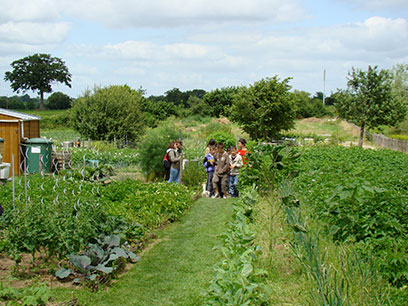 The surveyed biodiversity on these 187 plots is not surprising in terms of the nature of the plants found, since they are essentially cultivated or spontaneous plants that are common in disturbed urban environments. On the other hand, the found agronomic diversity is extraordinary in terms of the number of the different cultivated plants (nearly 1000 including 350 different species or types) and the number of varieties within certain species. On every plot, there are on average 34 cultivated plants including 19 vegetables. This cultivated diversity on a plot is comparable and even much greater for the most daring gardeners, with what one can find on the productive market gardening micro-farms studied in Kevin Morel’s thesis. Indeed, he describes systems of less than 1,5 ha per market gardener with more types of vegetables and herbs, which is already more diversified than what is conventionally considered reasonable in market gardening.
The surveyed biodiversity on these 187 plots is not surprising in terms of the nature of the plants found, since they are essentially cultivated or spontaneous plants that are common in disturbed urban environments. On the other hand, the found agronomic diversity is extraordinary in terms of the number of the different cultivated plants (nearly 1000 including 350 different species or types) and the number of varieties within certain species. On every plot, there are on average 34 cultivated plants including 19 vegetables. This cultivated diversity on a plot is comparable and even much greater for the most daring gardeners, with what one can find on the productive market gardening micro-farms studied in Kevin Morel’s thesis. Indeed, he describes systems of less than 1,5 ha per market gardener with more types of vegetables and herbs, which is already more diversified than what is conventionally considered reasonable in market gardening.
The gardeners’ knowledge about spontaneous flora is very heterogeneous. It ranges from those who fight weeds to those who have counted less than 178 species on their site.
As far as fauna is concerned, only the species that cause problems (cabbage, worms, bugs, aphids, etc.) or the most charismatic animals (fox, hedgehog, hare, lizard, etc.) are mentioned.
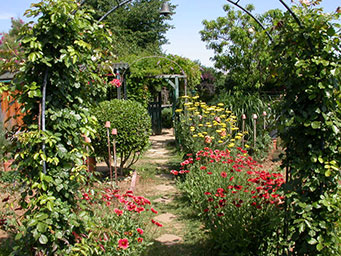 This study enabled us to confirm that certain sustainable practices are well established (composting, water collection, mulching) and that certain actions for biodiversity are increasing in frequency (nesting boxes, insect hotels). However, due to a lack of time and data, we were not able to investigate the potential role of allotments as agronomic conservatory, the presence of fallow meadows and their management, the presence of beehives both from the point of view of management and the preservation of wild pollinators.
This study enabled us to confirm that certain sustainable practices are well established (composting, water collection, mulching) and that certain actions for biodiversity are increasing in frequency (nesting boxes, insect hotels). However, due to a lack of time and data, we were not able to investigate the potential role of allotments as agronomic conservatory, the presence of fallow meadows and their management, the presence of beehives both from the point of view of management and the preservation of wild pollinators.
The meetings with the various gardeners made it possible to characterise practices that are increasingly virtuous for soil biodiversity and spontaneous flora. They also highlighted the gardeners’ desire to learn more about this subject (need for training), in front of which they often feel helpless, even if they generally have a positive but nevertheless relatively abstract image on it.
More generally, this work supports already published studies concerning the biodiversity in the community and family gardens (Joimel, 2015 ; Consales et al, 2016). It is based on a much larger sample than the one used before (with, however, correspondingly lower quality of useful data) and the results are consistent with the different other studies.
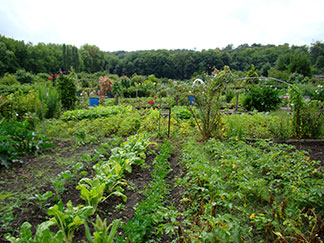 Thus we confirm that in addition to the many social-cultural benefits and food production allowed in the gardens (Draper & Freedman, 2010; Duchemin et al, 2010) Pourias 2014 et 2015) they also host an urban and agronomic ordinary but extremely rich diversity. Considering the various current and future health, ecological and economic crises, allotment and collective gardens are highly valuable infrastructures to be protected and developed.
Thus we confirm that in addition to the many social-cultural benefits and food production allowed in the gardens (Draper & Freedman, 2010; Duchemin et al, 2010) Pourias 2014 et 2015) they also host an urban and agronomic ordinary but extremely rich diversity. Considering the various current and future health, ecological and economic crises, allotment and collective gardens are highly valuable infrastructures to be protected and developed.
We are convinced that the application – to the letter – of coherent internal regulations associated with the gardening and environment charter could, together with information/training, be sufficient to maintain a satisfactory level of biological diversity and sustainable development.
Our sincere thanks to all those, who participated in this study and hearty congratulations to Mrs. Suzie Dermion, who successfully defended her thesis on 30th September 2020.
Sources: extracts from the thesis presented by Suzie Derminon for the AgroParisTech engineering diploma: “survey of the biodiversity on allotment gardens and the perception the gardeners have on this. Analysis of the answers given in the survey launched by the FNJFC in 2019”
Badis MERAD
Director FNJFC
Dear Allotment Gardeners
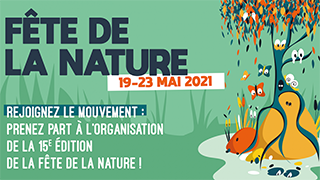 For many years now, the Association” Fête de la nature” ( Feast of Nature) has been organising a yearly international event in May called "La Fête de la nature".
For many years now, the Association” Fête de la nature” ( Feast of Nature) has been organising a yearly international event in May called "La Fête de la nature".
This year, the 15th edition will take place from 19 to 23 May 2021.
The “Feast of Nature” is five days of free events to allow everyone to experience nature at first hand. This major event will allow for a significant dissemination of practices in the garden, helping to create the much-needed havens for fauna and flora.
If the health context limits social contacts, the outdoor reception from which your gardens benefit nevertheless has the advantage of facilitating the respect of physical distance and barrier gestures guaranteeing the safety of everyone.
Following the call of the Fête de la nature Association, we ask you to join the adventure and become a 2021 organizer by opening your gardens to the general public.
How can you do this? Get information under: https://fetedelanature.com/ Propose a national event. Shortly a website portal will be opened for the inscription and highlighting of events proposed from outside France.
You are the worthy representatives of the allotments and the fauna and flora that make them up. Discovering the allotments and their resources is also ensuring their preservation.
We are counting on you!
Sandra BELE
Communication officer,
French allotment federation